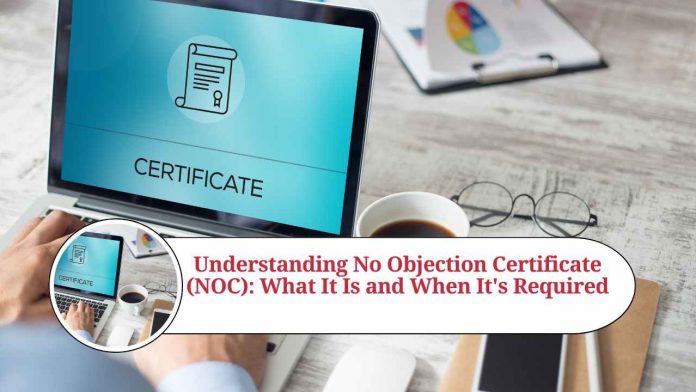Introduction of No Objection Certificate
A No Objection Certificate, also known as an NOC, is a legal document that is issued by an organization or a government authority to certify that they have no objections to an individual or an entity pursuing a certain activity or undertaking. NOCs are commonly used in a variety of contexts, including employment, education, immigration, travel, and business.
Employment NOCs are often required when an individual wants to change jobs, especially if they are moving to a different company within the same industry. In such cases, the NOC serves as proof that the individual’s current employer has no objection to their departure and that they are free to take up employment with the new company.
Education NOCs are often required when a student wants to transfer to a different school or university, especially if they are moving to a different state or country. In such cases, the NOC serves as proof that the student’s current school or university has no objection to their transfer and that they are free to enroll in the new institution.
Immigration NOCs are often required when an individual wants to travel or immigrate to a different country, especially if they are applying for a visa or a residence permit. In such cases, the NOC serves as proof that the individual’s current country of residence has no objection to their departure and that they are free to enter the new country.
Travel NOCs are often required when an individual wants to travel to a restricted or sensitive area, especially if they are a foreigner or a journalist. In such cases, the NOC serves as permission to travel to the area and ensures that the individual is not seen as a security threat.
Business NOCs are often required when an individual or an entity wants to start a new business or expand an existing one, especially if they are operating in a regulated industry. In such cases, the NOC serves as proof that the relevant government authority has no objection to their business activities and that they are complying with all the relevant regulations.
To obtain an NOC, the individual or entity usually has to submit an application to the relevant authority or organization, along with any necessary documents and fees. The application process can vary depending on the context and the jurisdiction, and it may take some time to receive the NOC.
In conclusion
NOCs are an important legal document that serves as proof of no objection from a relevant authority or organization. They are commonly used in a variety of contexts, including employment, education, immigration, travel, and business. If you need to obtain an NOC, it is important to understand the specific requirements and procedures for your context and jurisdiction.
Frequently Asked Questions (FAQs)
Q: What is a No Objection Certificate (NOC)?
A: A No Objection Certificate is a legal document issued by an organization or a government authority to certify that they have no objection to an individual or an entity pursuing a certain activity or undertaking.
Q: In which contexts are NOCs commonly used?
A: NOCs are commonly used in a variety of contexts, including employment, education, immigration, travel, and business.
Q: Why are NOCs required?
A: NOCs are required to ensure that individuals or entities have the necessary permissions to undertake certain activities or undertakings without violating any laws or regulations.
Q: Who issues NOCs?
A: NOCs can be issued by various organizations or government authorities depending on the context. For example, an employer may issue an NOC for an employee, while a government agency may issue an NOC for travel or immigration purposes.
Q: What documents are required to obtain an NOC?
A: The documents required to obtain an NOC can vary depending on the context and the jurisdiction. Generally, applicants will need to provide proof of identity and any other relevant documentation related to the activity or undertaking they are seeking the NOC for.
Q: How long does it take to obtain an NOC?
A: The timeframe for obtaining an NOC can vary depending on the context and the jurisdiction. It is important to check the specific requirements and procedures for your particular situation.
Q: Is an NOC always required?
A: No, an NOC is not always required. The need for an NOC will depend on the context and the jurisdiction, as well as any relevant laws or regulations.
Q: Can an NOC be refused?
A: Yes, an NOC can be refused if the relevant authority or organization has objections to the activity or undertaking. In such cases, the applicant may need to address any issues or concerns before reapplying for the NOC.
Q: Is an NOC a legal document?
A: Yes, an NOC is a legal document that serves as proof of no objection from a relevant authority or organization.




















